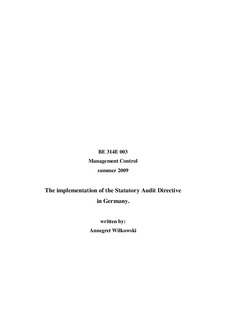The implementation of the Statutory Audit Directive in Germany
Abstract
This master thesis looks at how audit regulations is changed in the EU with special emphasis
on the implementation process of the Statutory Audit Directive (SAD) into Germany. Various
crises, the increasing globalisation as well as the aim of the European Commission to
establish a harmonised capital market have led to continuous changes of the audit regulatory
framework in the EU. The most recent change was thereby the SAD which has far-reaching
impacts on the national audit systems of its Member States. Germany is taken here as a case
country. The areas of the SAD which most affected Germany were cooperation, public
oversight and quality assurance.
The purpose of this thesis is to look more specifically at the implications the SAD has for the
German audit regulatory system with focus on the public oversight requirements. This
research will be supplemented by several different theories, namely crisis management,
institutional theory, travel of ideas, and auditing culture. The main empirical data has been
obtained through extensive documentary research, and in addition, a telephone interview with
the vice-chairman of the German auditor oversight committee.
The analysis showed that the anticipatory model can help to explain how audit regulations
change in the EU. Factors, like differing expectations and the relevant audit environments
influence what counteractive strategies are implemented. The SAD symbolizes thereby a
counteractive strategy of the EU to regain the trust of investors into the capital markets again.
The implementation of a public oversight is an important requirement but at the same time
presents a challenge for national legislators by incorporating it into the their audit regulatory
system.
The main conclusion of this research is hence that the SAD has led to major changes in the
audit regulatory system of the EU Member States that will help to make the capital markets
more secure and lead to more cooperation among each other. It remains however to be seen
how well that new system will work with the emergence of another major crisis.
Description
Mastergradsoppgave i bedriftsøkonomi - Høgskolen i Bodø, 2009
